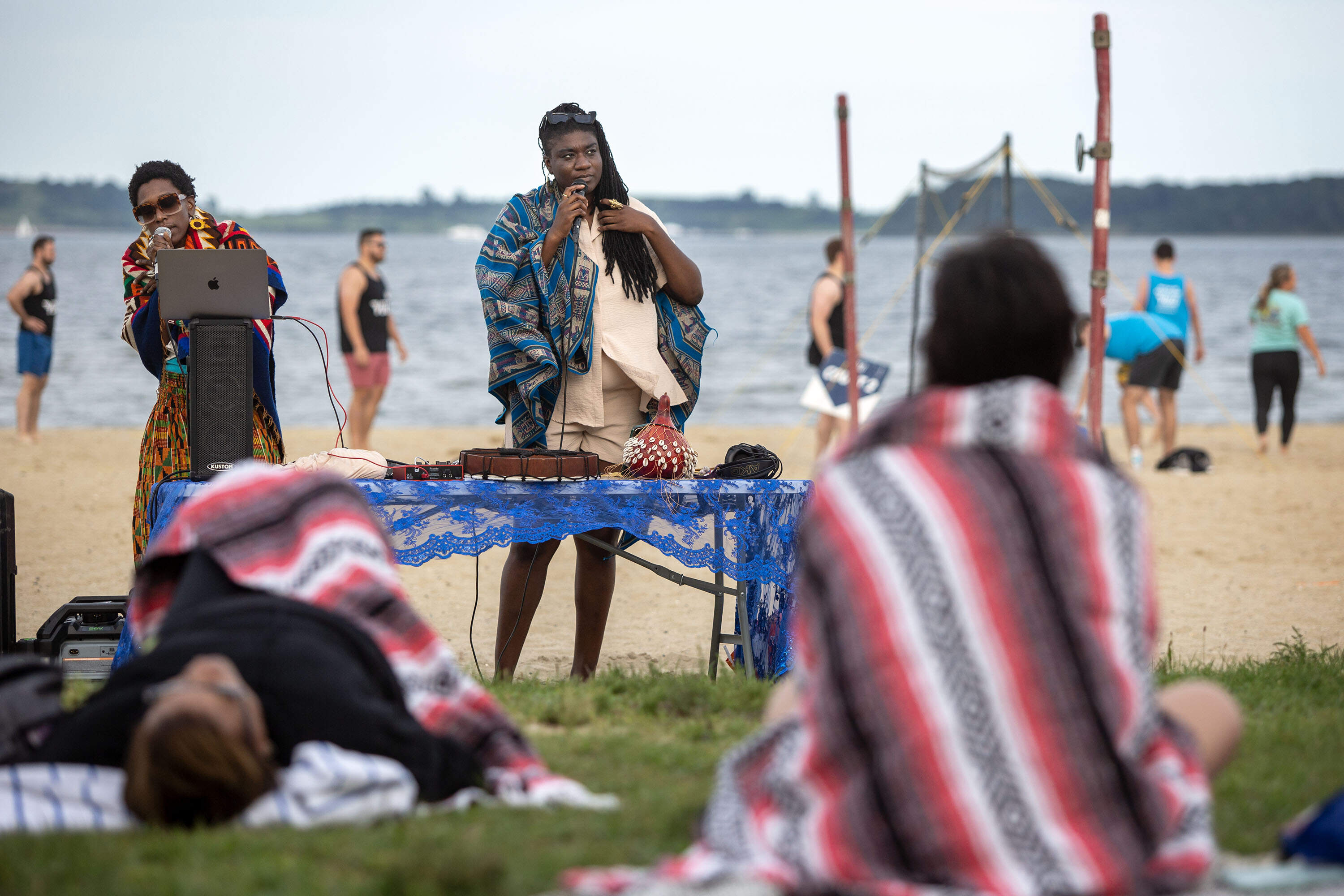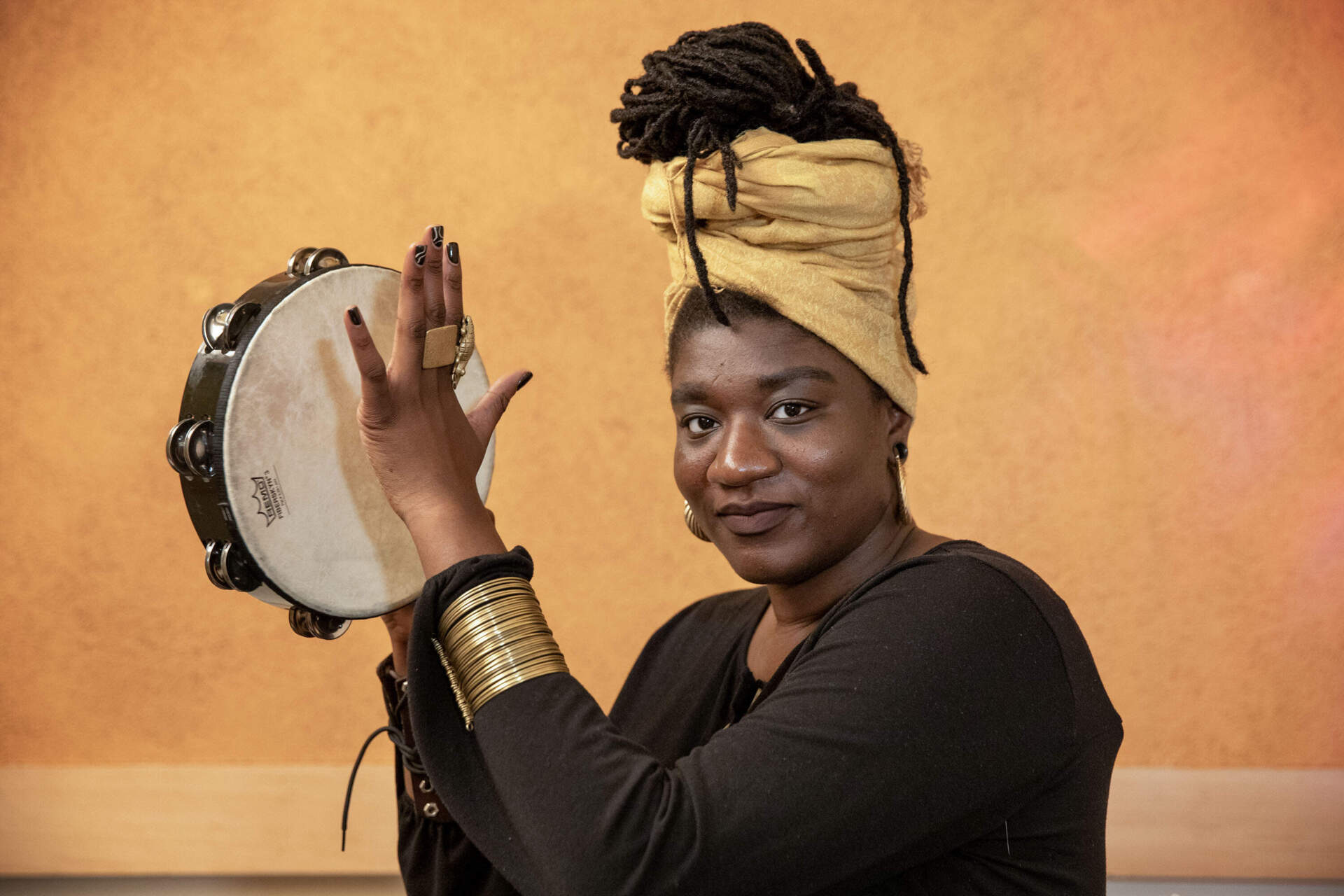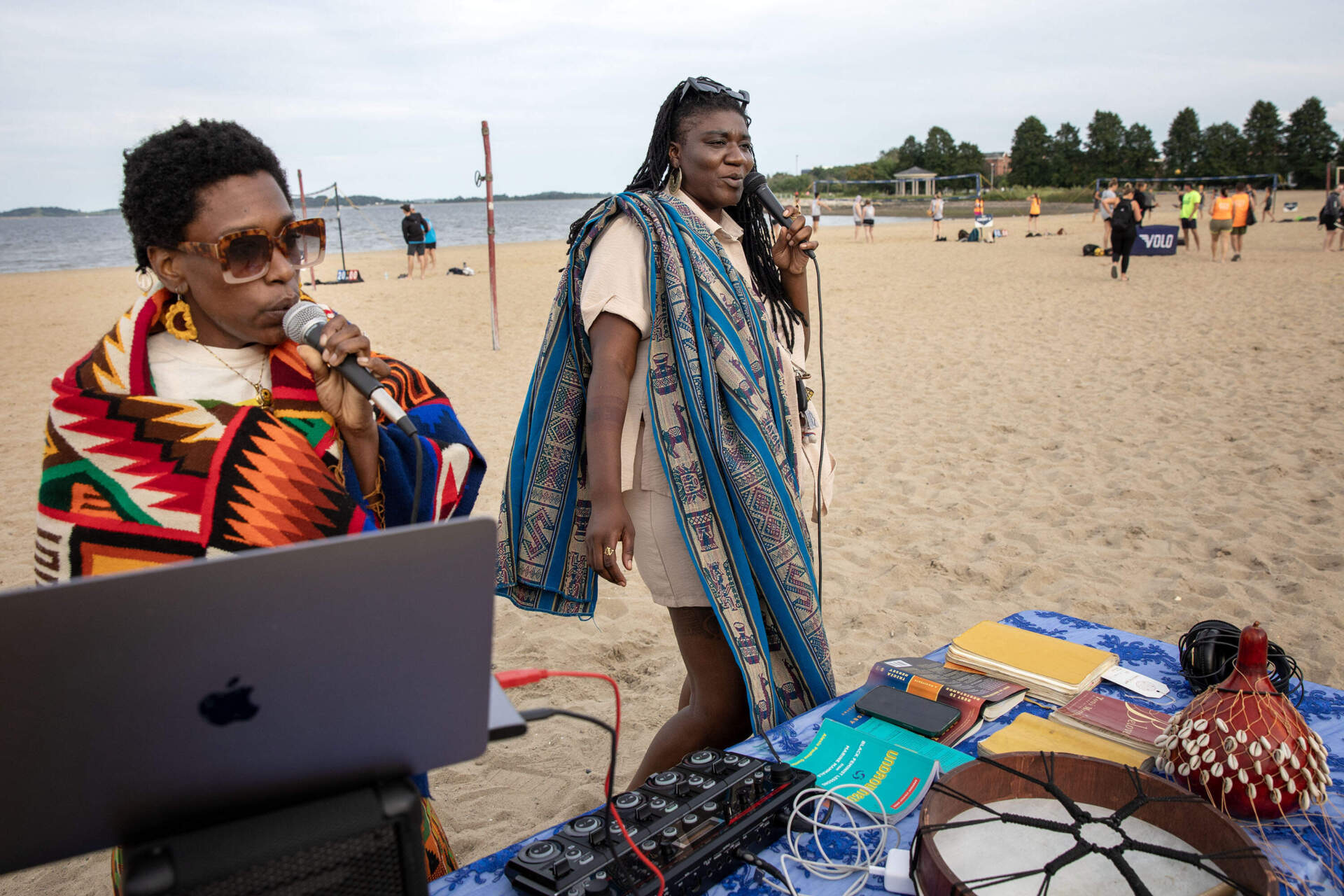
For Boston poet Dzidzor, performance is a lot like church
It was nearing golden hour at Roxbury Heritage State Park on a clear evening in August just as a gathering of Black Cotton Club was getting underway. A band grooved serenely as Dzidzor, a local poet, strolled across a brick patio in the center of the park, microphone in hand. She invited the spectators scattered across the grass on blankets and Adirondack chairs to come to the mic. When no one volunteered, she coaxed them — warmly, but persistently.
“Some of us are being a little shy,” Dzidzor said. “But that’s ok. We family.”
Someone kicked things off with a poem: “We used to pinky swear under yellow lights/ You were sitting comfortably on my handlebars as we cruised through the neighborhood,” he intoned, as drums and bass vamped behind him. Then a woman took the mic. “I’m not a poet. I’m not a singer,” she said, a little nervously. “Enjoying the faces, enjoying the outside.” The audience cheered supportively. Another poet came up, and then a rapper. Before long, everyone was on their feet, dancing, as the band ramped up and the sun sank toward the tree line.

Dzidzor Azaglo — who goes by just Dzidzor (pronounced jee-jaw) — is an accomplished poet and performer. If you’ve spent any time in the Boston poetry scene, chances are you’ve caught one of her offbeat performances that merge verse, music and spirituality.
But she’s probably best known for Black Cotton Club. She started the monthly jam session back in 2017; after a pandemic hiatus, it returned as a monthly outdoor series in the summer. Dzidzor was inspired by The Cotton Club, a Harlem nightclub where renowned Black musicians like Duke Ellington and Billie Holiday performed for all-white audiences in the Jim Crow era.
“I was like, well, why not sort of use this idea of the Cotton Club, but instead of it being a Black performer performing to an audience of white folks, Black performers really performing to themselves,” Dzidzor explained.
Over time that mission morphed into a kind of radical inclusiveness. Now, Black Cotton Club is a jam session where literally everyone is invited to take the mic, no matter their level of skill, though it is still primarily a Black space.
Advertisement
“This is a place for people to get their voices, their songs, their affirmations, their proverbs, their prayers, their reflections out and not feel the pressure of performing,” Dzidzor said.

This is classic Dzidzor. She has an uncanny ability to draw people in. It's what stood out to Boston's poet laureate, Porsha Olayiwola, when she first encountered Dzidzor in the local slam poetry scene.
“I just feel like she's wholly herself and a part of the stuff that she is, is filled with love,” Olayiwola said. “And so it feels like it trickles out to the rest of us.”
By Dzidzor’s own account, being "wholly herself" took a little work.
“I was a very shy kid,” said Dzidzor, who grew up in Charlotte, North Carolina to Ghanaian parents. “‘Cause I'm this lanky, dark-skinned, first generation kid who stood out not because she wanted to, but because … the way she physically appeared, just did stick out.”
Her father, a pastor at the family’s Pentecostal church, was the opposite. Dzidzor was awed by the power he had to move people with his sermons, though she wasn't a fan of church herself; she found it too dogmatic, too judgmental. “But I recognize[d] the beauty and the power that one can hold when you speak,” she said.
Instead, Dzidzor started competing in local youth poetry slams. Performing allowed her to free herself from the feeling that she needed to be smaller, less visible — and through poetry, she could express her anger about it.
“As a first generation kid, you sort of learn how to make others comfortable in ways that suppress how you [wish] to express yourself,” Dzidzor explained. “You cannot show your anger, you have to play nice, you have to be better, three times better than the next person behind you.”
She found she could sneak challenging messages into her poetry; it was a way to win people over before making them think. This philosophy carries through in her work today, which merges music and movement with poetry. Beneath Dzidzor's warm stage presence is a politics of Black liberation.
“I feel like Dzidzor is always practicing what it means to be unfiltered and unadulterated and uncolonized,” Olayiwola said.
Recently, Dzidzor found her way back to her churchgoing roots. In 2021, she entered a master of divinity program at Boston University.
“Theology, in a very radical way, is making meaning of living,” she said. “I was very curious about the role of Christianity and how it can spark activism and the ways that it's caused harm, and the ways that it's provided a space for healing.”
At BU, Dzidzor developed a multimedia performance called “Reconfiguring God,” inspired by the writings of 19th-century Black women preachers.
“Half of them were enslaved, or formerly enslaved,” said Shively Smith, BU assistant professor of New Testament. She helped Dzidzor conceive the project. “So, here they are reading the Bible in a way that says, ‘No, we are made in the image of God.’”
Dzidzor staged the first performance in June at the Old North Church in Boston. She positioned the musicians in the church's balcony, high above the audience in the pews.
“She came up with this idea of voicing Black women's spirituality from the places … these women would have likely occupied in the 19th century in a church like Old North,” Smith said. “Which would have been in the rafters, away from the altar.”
The nearly hour-long piece merged the women’s writings with poetry, storytelling, music and dance.
“It just became a live experience of how all these voices, across different times, are saying ... very radical things but are saying it in collaboration with each other — including my own voice as well,” Dzidzor said.
At the end of the performance, Dzidzor, decked in a black tulle skirt, delivered a blazing recitation of Sojourner Truth’s “Ain't I A Woman?” Then, slowly, the music picked up. The band launched into a propulsive polyrhythm while the singers chanted: “A god that sees me, a god that sees me.” Dzidzor danced down the aisle, motioning for the audience to join in.
Was it performance art, or church? Maybe it didn’t matter. By the end, the audience was on its feet.
This segment aired on October 19, 2023.


